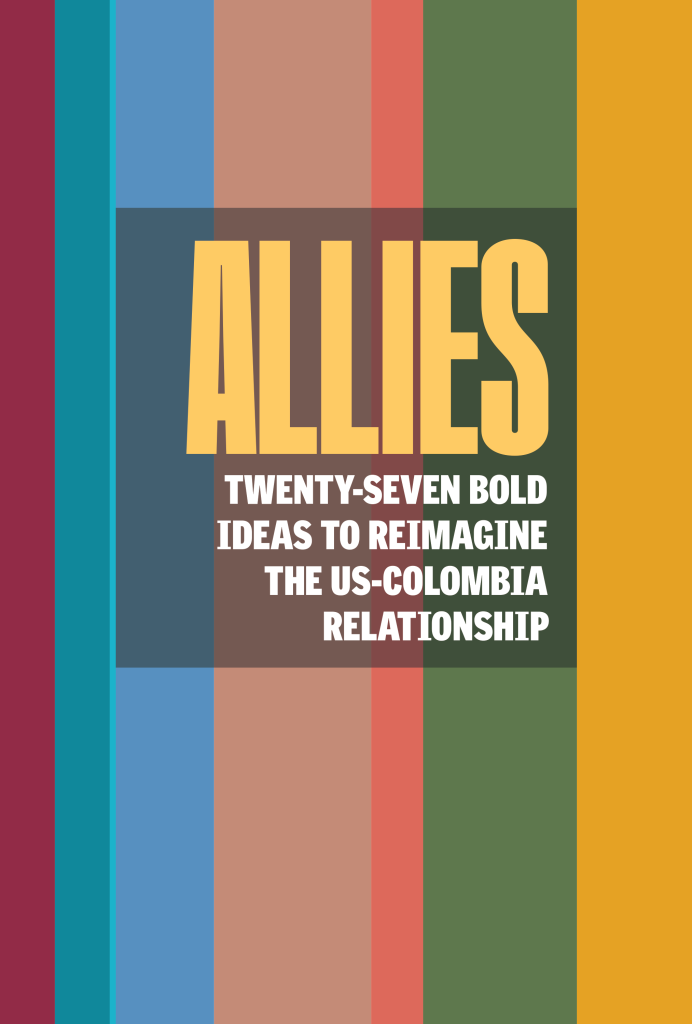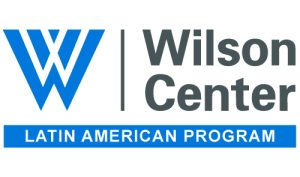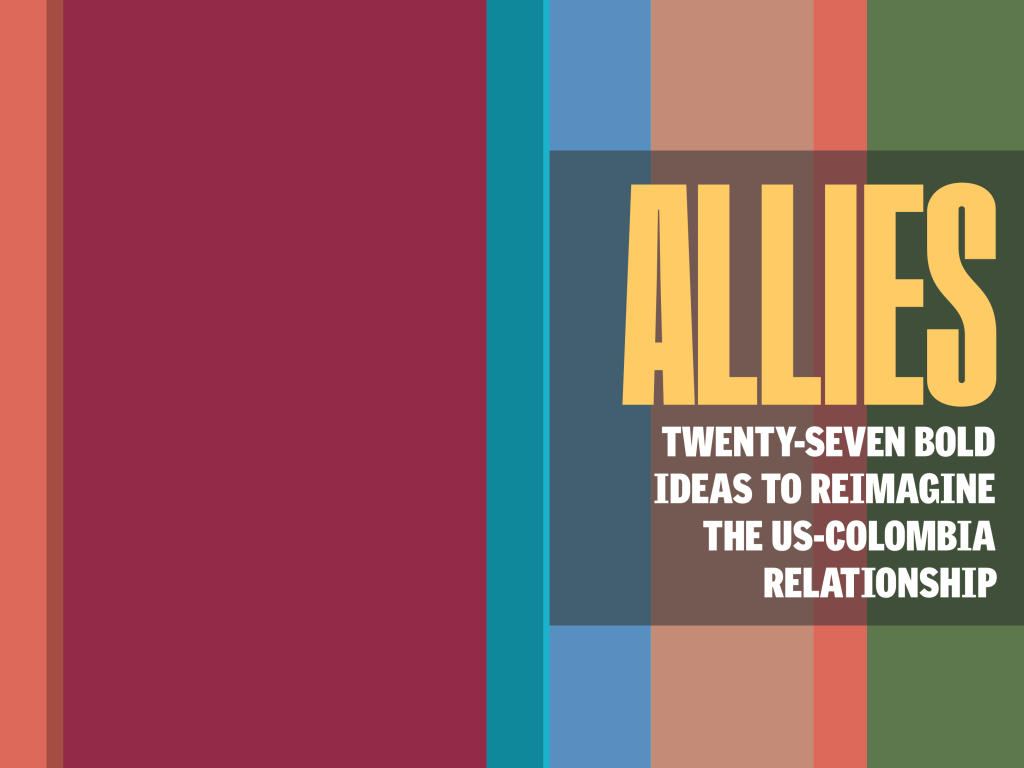After two decades of a transformative partnership under the Plan Colombia framework, our countries’ relationship is at a critical moment. At the Atlantic Council, we believe this moment opens the door for a reimagined US partnership with Colombia based on a shared vision for a more prosperous, inclusive, and sustainable future.
This book is intended to advance the next phase of the US-Colombia relationship. In a rapidly changing world, the following chapters present a roadmap for a new type of engagement that challenges our ambitions and extends the ties that bind our countries. Regard the ideas in this commemorative book as a new beginning.

Foreword by Fred Kempe and Jason Marczak
Working with partners and allies
In June 19, 1822, the United States and Colombia formally established diplomatic relations. On that day, President James Monroe accredited Colombia’s Manuel Torres as the first Charge d’Affaires from a Latin American country to the United States, assuring him of US support for the “welfare and success of his country.” Today—two hundred years later—Colombia remains one of our closest allies.
To this day, we share a common purpose in the power of our democracies, although imperfect, to find answers to the most challenging issues of our time. Our deep partnership goes far beyond bilateral issues and extends to commercial, security, social, environmental, and humanitarian fronts.
Underpinning this partnership has been consistent, bipartisan US sup- port for Colombia across recent administrations. In 2000, President Bill Clinton signed Plan Colombia into law, a strategic framework designed to help Colombia counter drug trafficking and improve security. For the next sixteen years, and with $12 billion in funding, Republican and Democratic presidents alike advanced Plan Colombia with bipartisan congressional backing. Plan Colombia provided financial support, but its most important contribution was the technical assistance that further united our two societies. Today, Plan Colombia is widely regarded as one of the most consequential foreign policy initiatives in modern US history, which explains the ongoing support for its successor project, Peace Colombia.
At the turn of the 21st century, it was nearly impossible to imagine the broader importance or possibility of a prosperous Colombia. US attention was focused on the threats posed by a country where insurgency groups, fueled by the drug trade, controlled 40 percent of its territory, approximately the size of Tennessee or Louisiana. Bombings and kidnappings regularly featured in its daily news.
Fast forward to 2022. Colombia celebrates five years as a Global Partner of NATO, and upon the Russian invasion of Ukraine, stepped up to offer diplomatic and humanitarian assistance. Colombia was recently designated as a Major non-NATO ally—the eighteenth country globally with this status— and the US-Colombia Trade Promotion Agreement marks ten years since ratification. Once a source of migrants itself, Colombia has welcomed nearly two million Venezuelan migrants and refugees, providing them with protection, legal documentation, and access to employment and social services.
Twenty years ago, many worried about the survival of the Colombian state. But sustained US-Colombia collaboration helped transform Colombia from a nation on the brink of decline to a robust economy and prosperous democracy. Now, the question is what would come of US interests in Latin America without the support and leadership of Colombia, often referred to as the “keystone” of US foreign policy in the region. Alternatively, how can we build on this partnership to answer the challenges we will face in the
decades to come?
In March 2021, when announcing his intention to designate Colombia as a Major non-NATO Ally, President Joseph R. Biden said, “We will only succeed in advancing American interests and upholding our universal values by working in common cause with our closest allies and partners, and by renewing our own enduring sources of national strength.”
At the Atlantic Council, we believe this moment opens the door for a reimagined US partnership with Colombia to shape the global future together. It is why we first launched our US-Colombia Task Force in 2017, co-chaired by Senators Ben Cardin and Roy Blunt, and why its work prioritizes innovative solutions to accelerate the opportunities and address the irritants in the relationship.
This book is intended to advance the next phase of the US-Colombia relationship. In a rapidly changing world, the following chapters present a roadmap for a new type of engagement that challenges our ambitions and extends the ties that bind our countries. Regard the ideas in this commemorative book as a new beginning.
The importance of the US-Colombia relationship is reflected by the caliber and diverse perspectives of the featured authors. From President Bill Clinton to Howard Buffet to John Leguizamo, the voice of Bruno in the 2021 hit film Encanto, set in Colombia. The authors also reflect the continued bipartisan nature of our relationship with essays from our US-Colombia Task Force co-chairs and the Chairman and Ranking Member—Representatives Gregory Meeks and Michael McCaul, respectively—of the House Foreign Affairs Committee. Prominent Colombian policymakers, businesspeople, and academics add their perspectives throughout these pages.
The essays in this volume are a jumping-off point to stimulate new thinking for our next century together. We hope this book will help us not only recognize what we have accomplished but also what we can do together in the future to achieve the joint success first laid out by Monroe.
Frederick Kempe
President and Chief Executive Officer, Atlantic Council
Jason Marczak
Senior Director, Adrienne Arsht Latin America Center, Atlantic Council
Introduction by Camila Hernandez
In the summer of 2014, my plane from Bogotá, Colombia, landed in Washington DC, and by 2019, I joined the Atlantic Council. In the three years since, I have been fortunate to work alongside many of the visionaries that have helped build the US-Colombia relationship. And if something is clear, it is this: our shared future is brighter and more hopeful than ever before.
As we celebrate the bicentennial of US-Colombia relations, we should recognize how far we have come, the new challenges we face, and the immense potential that remains. This book is a collective effort to do just that. Its twenty-seven essays by business leaders, politicians, philanthropists, artists, and academics invite us to think boldly and creatively about the future of the relationship, building on an impressive track record of adaptation and achievement.
We assembled a roster of nearly forty contributors, all well-established voices in their fields, to represent the many thought leaders who play a role in strengthening US-Colombia ties. Our hope is for this effort to serve as a launching pad for new thinking, dialogue, and a renewed commitment to our shared future.
This book is also an appeal to seize emerging opportunities for US-Colombia engagement in seven overarching areas reflected in the book’s chapters. These include and go beyond traditional areas of collaboration, setting the foundation for a revitalized US partnership with Colombia.
The first chapter looks at the US-Colombia relationship in a global con- text, showing how a stronger and more resilient alliance will pay dividends far beyond our borders. Chapter two explores strategies to enhance our mutual security, building on our history of successful intelligence sharing and military-to-military cooperation while recognizing new threats and realities.
In chapter three, the authors offer innovative approaches to strengthen democratic institutions, the rule of law, human rights protections, and peace process implementation. Chapter four explores how to advance inclusive and sustainable economic growth by improving productivity, increasing trade and investment, and promoting energy transformation.
Chapter five proposes ideas for collaborative engagement in addressing environmental challenges and protecting natural ecosystems in Colombia— the second-most biodiverse country in the world. Chapter six explores ways to support further Colombia’s eight-million internally displaced people and the nearly two million Venezuelan migrants and refugees welcomed within its borders.
The book’s final chapter includes stories of the many Colombians and Colombian Americans in the arts and sciences who have contributed to the US economy and society. Even the design of this book celebrates such contributions—the text font was made by a Colombian type designer, and the paintings of Fernando Botero inspired the color palette.
Throughout these pages, QR codes are linked to corresponding online videos of US and Colombian thought leaders. Incorporating new technological capabilities into this volume was another way to recognize our world’s ever-changing nature and to remind us, as we move forward, that the US-Colombia relationship should remain adaptive, resilient, and creative.
Camila Hernández
Associate Director, Adrienne Arsht Latin America Center, Atlantic Council
27 bold ideas
Videos
Bonus content
Afterword by Ambassador Mark Green and Cynthia J. Arnson
The United States has many allies and partners around the world, but only a small number of true friends, bound in a unique relationship that has stood the test of time and the twists and turns of history. As this book reminds us, Colombia is certainly in that small number. The United States and Colombia are bound together by history and culture.
Colombians have helped shape the very fabric of US society. Americans have enjoyed studying Colombian literature, listening to its music, admiring Colombians on television and in movies, cheering on hometown legends in sports, and tasting Colombian food and coffee.
We are bound together through economic ties and our shared belief in the importance of private enterprise and inclusive economic development. This year marks the tenth anniversary of the US-Colombia Trade Promotion Agreement, which has seen Colombia rise to become our twenty-fifth largest trading partner in total two-way goods and services. Colombia has been welcomed as a member of the OECD and as a Major non-NATO Ally.
We are bound together through our partnership, most deeply since the advent of Plan Colombia, in addressing key transnational challenges— the scourge of illicit narcotics, the rise of authoritarian forces in the hemi- sphere, economic inequality, the causes of and fallout from rapidly increasing climate extremes, and the impacts of forced human displacement.
Perhaps most importantly, we have been bound together by the values our people share: a belief that representative democracy, market economies, and human rights and human dignity are the essential foundations of healthy societies that strive to meet the central aspirations of their citizens.
The many contributors to this volume rightly celebrate the extraordinary bipartisanship that has characterized the US approach to Colombia. It is important to recall that bipartisanship did not simply emerge; leaders in both nations worked together to overcome challenges and disagreements. These open, honest, and fruitful debates—and the ability to adjust policy to incorporate different perspectives—are precisely what has given strength and resilience to policy over time.
We have seen tremendous progress and opportunities in Colombia throughout our professional careers. During Mark Green’s tenure as administrator of the US Agency for International Development, he visited Colombia five times—more than any other country. What brought him back repeatedly were not just the challenges at hand—fallout from the tragedy of Venezuela’s economic and authoritarian descent— but opportunities to help Colombia lift lives, build communities, and expand hope. He is proud to have partnered with President Iván Duque’s administration to extend the formalization of land titles in rural communities, support community-based development projects that create viable alternatives to the illegal drug trade, strengthen protections for biodiversity, increase the inclusion of Afro-Colombians and other marginalized communities, and so much more. And he is just as proud to be part of the Wilson Center and its Latin American Program, which has partnered with Colombian leaders and scholars over the years in crafting ideas and alternatives to bring Colombia’s promise to every part of society.
For her part, Cindy Arnson first visited Colombia as a researcher for Human Rights Watch in 1993, when Pablo Escobar’s bombs still scarred downtown Bogotá and terrorized the country. At the Wilson Center, she followed closely the arduous efforts to achieve a peace accord in Colombia as part of a comparative project on negotiated settlements to civil wars. Despite many remaining challenges, the country’s transformations over these thirty years are astonishing, the product of the immense resilience, sacrifice, and never-ending creativity of Colombians themselves.
There is no question that, despite its past achievements, US-Colombian relations need further strengthening to face unique and profound challenges. Holding on to a bright future will require imagination, creativity, and a shared commitment.
The existing networks of past and present public officials, private sector and civil society leaders, journalists, and cultural icons provide a deep well of experience and strength from which to draw. And the growing density of relations between our two societies provides an asset and further opportunity for deepening ties.
Let us not forget the sacrifices made or the hard work and commitment it took to get this far. We must work collaboratively to protect and strengthen Colombia’s strong and vibrant democracy.
In the years ahead, it’s clear that there will be bends in the road and many challenges to confront, just as there were over the last two hundred years. But the future for its resilient people is bright, indeed. So, too, is the future of the US-Colombia relationship. We are allies and partners, but most importantly, we are close friends.
Amb. Mark Green
President and CEO, Woodrow Wilson International Center for Scholars
Cynthia J. Arnson
Distinguished Fellow; Former Director, Latin American Program, Woodrow Wilson International Center for Scholars
Related event
In partnership with

With the support of






The Adrienne Arsht Latin America Center broadens understanding of regional transformations and delivers constructive, results-oriented solutions to inform how the public and private sectors can advance hemispheric prosperity.
